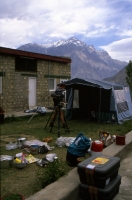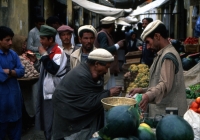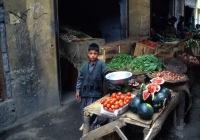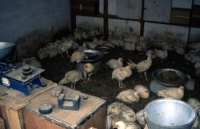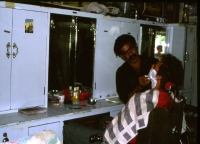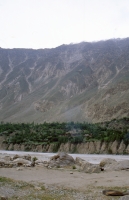Memories from a second expedition-doctor. By Wouter J.W. Beelen.
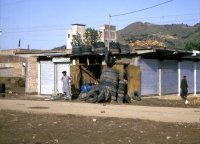 025_Karakoram Highway
025_Karakoram Highway
Lots of new old tires. Probably re-used many times more than we do, here in the most modern west.
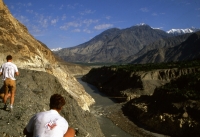 026_Karakoram Highway
026_Karakoram Highway
Views along the Indus valley. In these surroundings I advised Ronald Hulsebosch -the other doctor- to peel his apple to prevent intestinal disease (diarrhoea, Delhi-belley etc).
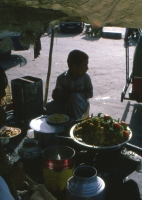 027_Highway-Fastfood
027_Highway-Fastfood
Tasty (but dangerous!?) Pakistan food. Our first evening in Pakistan Major Zia welcomed us warmly by inviting us to his very traditional custom curry restaurant in Islamabad.
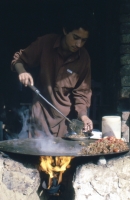 028_Highway-Fastfood
028_Highway-Fastfood
The food looked very tasty indeed and we all ate well. Only one didn't get well.
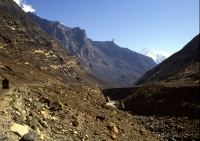 029_Karakoram Highway
029_Karakoram Highway
Indus valley view. Dusty and dry. Here Ronald Hulsebosch, peeling an apple with his brand-new Swiss army pocket-knife (like I advised a little earlier), cut off his little finger bending-tendon. I was the only one other doctor to suture the wound. It took an unpleasant lot of time to rediscover the outstanding medical equipment in all the stowed-away gear.
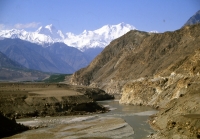 030_Nanga Parbat
030_Nanga Parbat
Indus valley with Nanga Parbat, the Naked Mountain (8125m). Then, in these wind-blown, dust-rich surroundings, with a very brave patient who was a more experienced doctor, who wouldn't have any anaesthesia, with a television-camera over my shoulder, I sutured that wound. Quite nervously trembling and not very neatly of course. I was ashamed of myself.
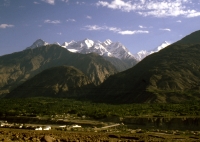 031_Gilgit-Rakaposhi
031_Gilgit-Rakaposhi
That same afternoon we arrived in Gilgit. At night, hardly 48 hours in Pakistan, I got very sick: Abdominal cramps, fever, body fluids leaving from several sides at almost the same time. Expedition had hardly started and already I got very ill. The next day all team-members had a relaxing day visiting a polo-match (traditional sport there!), while I had to stay in bed capable of nothing else than staying in my bed.
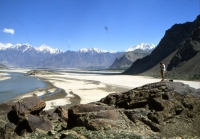 032_Indus Valley
032_Indus Valley
Another day later, me still feeling far from well, we leave for Skardu. Skardu is in the background.
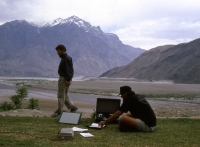 033_Skardu K2 Motel
033_Skardu K2 Motel
Karakoram expeditions traditionally stay in the K2-Motel in Skardu, conveniently situated besides Indus River. Here Joost uses the Satellite-phone; probably to call one of his lovers.
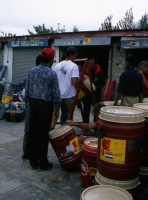 035_Skardu K2 Motel
035_Skardu K2 Motel
The loads had to be split in packs of no more than 25 kilo's each. That's the maximum load a porter may carry.
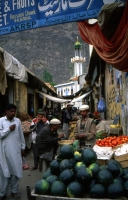 036_Skardu Market
036_Skardu Market
Skardu market is full of fresh fruits and vegetables. Seasalt and iodine on the other hand are relatively scarce here.
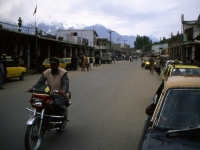 040_Skardu Main Street
040_Skardu Main Street
Main street like anywhere. Yellow and black remain preferred colours here. I don't know why.
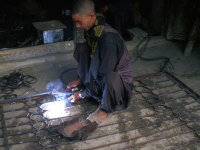 042_Skardu Welding
042_Skardu Welding
Welding like anywhere? In Skardu the mask is not necessary. Availability of ultra-violet light is no problem at these elevations.
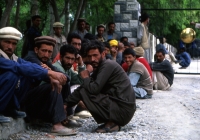 043_Skardu Porters
043_Skardu Porters
The porters wait in front of the motel to get a hard job with a year's salary earned in 1 week. The work should be equally divided between the porters from Skardu and the ones on the road to the expedition's destination.
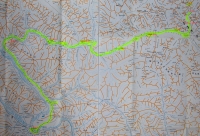 044_Skardu-K2 Trail Map
044_Skardu-K2 Trail Map
The trail from Skardu to Chongo is jeep-trail for about 110 km; from Chongo the walk goes to K2-basecamp (another 100 km). The government once tried to take the road way to Askole, the most far-away permanent settlement, but this road-part suffered big damages each winter and could not be preserved.
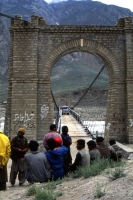 045_Shigar Bridge
045_Shigar Bridge
The road first leads over Indus River, then along Shigar River. A little later we cross a side river from Shigar river. First we waited a long time because the guards of the bridge considered our papers not valid. Military strategic property; no pictures allowed!
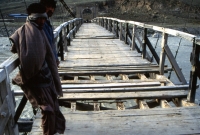 046_Shigar Bridge
046_Shigar Bridge
The good major Zia arranged this. Then we waited a long time again because only one jeep at a time may cross the bridge. Here you see why. Military strategic property; no pictures allowed!
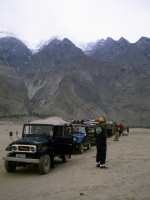 047_Shigar Valley
047_Shigar Valley
Major Zia with his hands in their favorite position. Every now and than we halt; most of the time nobody knows why. Sometimes we stop for the camera-crew to make a shot of the passing caravane.


